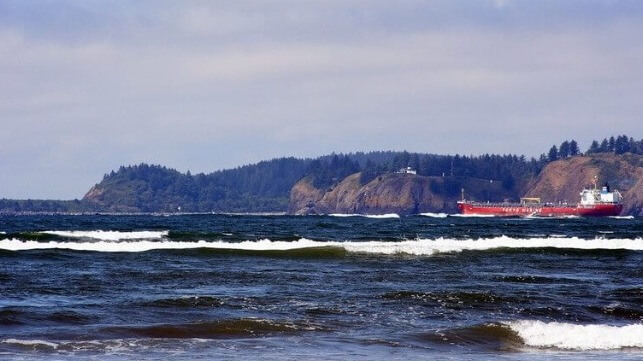Fishing Captain Fined for Cutting Across Bow of Ro/Ro on Columbia Bar

The U.S. Coast Guard has issued a notice of violation to the captain of a crab-fishing vessel for negligence after he nearly caused a collision with a 600-foot ro/ro.
On the day of the near-miss, the commercial fishing vessel was outbound on the Oregon side of the Columbia River Bar, a notoriously difficult crossing with frequent merchant vessel traffic. Visibility was restricted. Meanwhile, the ro/ro Grand Race was inbound near Buoy Number 8, just south of Peacock Spit. The commercial fishing vessel, without providing notice or sound signal, changed course to cross the channel to the northern (Washington) side. By making this maneuver, she cut across the bow of the Grand Race, creating a serious risk of collision.
The pilot aboard the Grand Race detected the risk and repeatedly hailed the fishing vessel on channels 13 and 16. He sounded the danger signal, but got no response from the commercial fishing vessel.
As a final measure to avoid collision, the pilot aboard Grand Race hailed the harbor pilot vessel Astoria for assistance. The Astoria managed to warn the fishing vessel of the impending danger by shining a spotlight directly at the vessel. This finally prompted the fishing vessel to change course and avoid collision.
In a message to the fishing community, the Coast Guard warned that this was a bad start to an otherwise celebratory event - the first on-time opening of the lucrative Dungeness crab fishery in seven years, coupled with an unusually high price per pound.
"Fishermen haven’t even started pulling pots and retrieving their catch, and we have already had a near miss that could have resulted in multiple casualties," said Lt. Carl Eschler, chief of the investigations division at Coast Guard Marine Safety Unit Portland. "No matter how long you have been fishing, please don’t get complacent. Maintain a proper lookout, monitor channel 16, and notify the Coast Guard as required prior to crossing a hazardous bar. The Coast Guard is here to assist, and given the choice, would much rather provide information to a vessel operator unfamiliar with local bar conditions or provide an escort across a hazardous bar then respond to a vessel in distress."
The Coast Guard alleges that the master of the fishing vessel violated COLREGS Rule 5 (maintaining a proper lookout) and Rule 9 (safe navigation in channels and fairways), resulting in the federal offense of "interfering with operations of a commercial vessel in a negligent manner that endangers life, limb, or property." The recommended minimum penalty is $5,000, up to a maximum of about $35,000.
"The issuance of a civil penalty is one way for the Coast Guard to compel compliance and help to save lives," said Lt. Eschler.

that matters most
Get the latest maritime news delivered to your inbox daily.
Navigation regulations near the Columbia require all vessels over 20 meters to monitor Channel 13. However, the inshore fishing fleet of the Pacific Northwest coast is well known among mariners for failing to respond to radio calls, and this occasionally forces workboats and ships to change course to minimize the risk of collision.
Traffic on the Columbia River Bar crossing (Bruce Fingerhood / CC BY 2.0)
